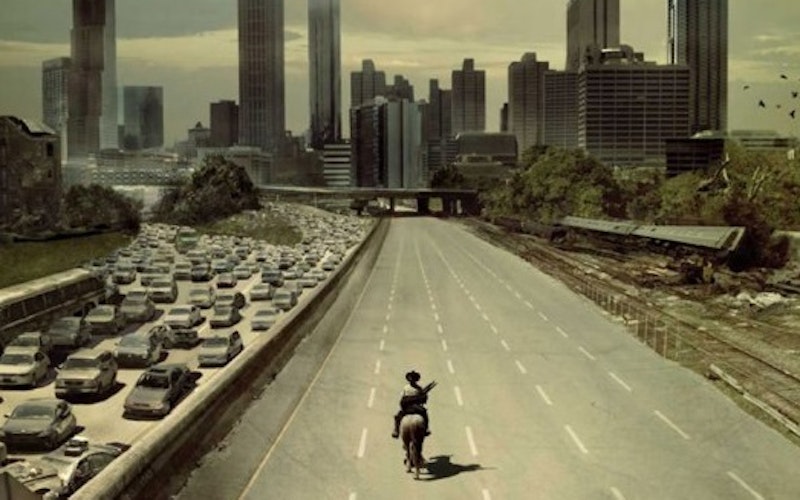
Culture At Large
Surviving the apocalypse, with help from Charles Taylor
Charles Taylor is having a moment.
Although long respected in the world of Catholic political philosophy, Taylor’s inimitable scholarly work on the nature of modernity has suddenly appeared in Christian culture more broadly, thus furnishing a long-deserved wider audience.
In 2014, James K.A. Smith wrote a guide to Taylor’s seminal book, A Secular Age, in which he presents a survey of Taylor’s definition of “secular.” Secular culture, Taylor argues, is not defined by the absence of God, but rather by an anthropocentric attitude toward religious life - a perspective that values, above all, individual choice and, indeed, the ability to make of God what one wills.
Now, on the heels of Smith’s book and with Taylor’s work as its guide, comes How to Survive the Apocalypse: Zombies, Cylons, Faith, and Politics at the End of the World, by Alissa Wilkinson and Robert Joustra. It’s a penetrating, contemplative work of cultural criticism about what the narratives we tell ourselves say about the kind of world in which we live.
For Wilkinson and Joustra, Taylor’s ideas explain much about our culture’s obsession with the end of all things. “The world is going to hell,” they write. “The apocalypse sells like mad.” Turn on cable television most any Sunday evening or take a trip to your local multiplex and look around. Our pop culture is inundated with tales of the un-dead and robot destroyers and the end of mankind, with stories of apocalypse and dystopia.
Such stories, Wilkinson and Joustra claim, reveal “a great deal more about who we are now” than who we might become. The kind of stories we remember and pay attention to reveal what matters to us. As the authors put it, they reveal “the tensions endemic to our modern moral order.”
The apocalypse is already upon us, and these works of pop culture are evidence of its advent.
And that’s where Charles Taylor’s definitions can be helpful. Where previous ages viewed religion as an ultimate good, our “anthropocentric shift,” as Taylor calls it, has instilled within us an instinct to worship the individual above all else. We are dedicated to our own meaning, even within the context of religious experience. The ability to make individual, highly personalized choices about how we interact with God, tradition and religious institutions is a higher good than God Himself. And so it should come as no surprise that a culture consumed above all with the value of the individual should eventually become consumed with that individual’s destruction. Fear drives much obsession, after all.
This is our present reality, argues How to Survive the Apocalypse. The Walking Dead and Battlestar Galactica and Her and Game of Thrones and House of Cards and Breaking Bad “aren’t just creative stories,” Wilkinson and Joustra write. “They’re our collective social anxieties aired on prime time.” They exist precisely because of this anthropocentric perspective.
But the apocalypse is not some sort of “terrifying possibility out there in the future,” the authors argue. Rather the apocalypse is already upon us, and these works of pop culture are evidence of its advent. Our collective obsession with the sort of individualism and subjectivism these cultural artifacts explore has led to an upheaval which demands that we re-think the way we interact with each other, build communities and create culture. Like the Israelites upon their captivity in Babylon, the traditions that defined our culture for millenia have been, in many cases, abolished or buried and we are now captives in a strange land.
So as Christians we must ask ourselves, as Wilkinson and Joustra do, “How do we live together after the ‘apocalyptic’ deconstruction … of our systems, our institutions and our inheritance.” We live in Babylon and it’s pretty self-absorbed. And yet our culture’s questions about identity are valuable, profound, even necessary. That the answers given in our popular culture aren’t always in keeping with our faith does not diminish the quality of the questions themselves. As Christians, our job is to engage in the conversation.
Ultimately, Wilkinson and Joustra argue, we need to be like Daniel, who was a “faithful compromiser,” who learned to “sing the Lord’s song in a strange land.” Though we may feel “out of place in this secular age,” we cannot turn our backs. We can’t wash our hands of it. Instead, we should “work among the ruins” of our time, seeking to restore within it that which is good.
And, in its own way, How to Survive the Apocalypse is doing exactly that.
Topics: Culture At Large, Arts & Leisure, Entertainment, Books, News & Politics, History